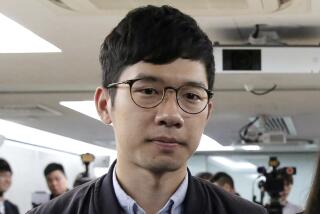2 Britons, Australian Could Face Military Trial
- Share via
LONDON — British and Australian officials announced Friday that two Britons and one Australian are among the six terrorism suspects that the United States says are eligible for U.S. military trials, sparking criticism from human rights groups, lawyers and suspects’ relatives.
U.S. officials had refused to identify the suspects when they announced the tribunal decision Thursday, since charges have not been filed, but three names were released Friday in Britain and Australia, both of which joined the U.S.-led war in Iraq. British officials said they would “vigorously” seek access to citizens Moazzam Begg, 35, and Feroz Abbasi, 23. Australian national David Hicks is also in the group, said Australian Atty. Gen. Daryl Williams.
Criticism of the U.S. decision was swift.
“This is the first time I’ve ever heard a friendly government announce that Britons are not going to get a fair trial in advance of starting the trial,” said Stephen Jakobi, who heads a legal assistance movement called Fair Trials Abroad. He was one of several people who spoke to BBC News.
“The U.S. Department of Defense will appoint the judges and prosecutors, control the defense and make up the rules of the trial,” Jakobi said. “It appears to have only one objective -- to secure a conviction.”
“We have made it very clear that as far as this government is concerned we object to the death penalty -- and certainly if there is a suggestion that there may be resort to the death penalty, the British government will object very strongly,” said Baroness Elizabeth Symond of the Foreign Office. She also said: “I think there are issues about the principle of using military commissions.”
“The prosecutor is military, the jury is from the military ... everything is being done by the military -- it is not a fair trial,” said Azmat Begg, Moazzam’s father, in Birmingham. “My son was never involved in Al Qaeda. He is a proper, family man.”
Abbasi’s attorney, Louise Christian, said his client’s mother, Zumrati Juma, was “extremely upset and very fearful for her son.”
“He was only 19 when he left home, and it is impossible to believe that her son could have been a senior member of any organization,” Christian said.
In Australia, Hicks’ lawyer, Stephen Kenny, said his client faced “an American kangaroo court.”
Amnesty International, the London-based human rights organization, said the selection of the six for possible military trial was “another retrograde step for human rights in the U.S.-led ‘war against terrorism’ and will further undermine the U.S.A.’s claims to be a country that champions the rule of law.”
U.S. officials have said all six prisoners -- like the others at the U.S. naval base at Guantanamo Bay, Cuba -- were suspected of involvement with Al Qaeda, the Taliban or another terrorist group.
Some of the six may have attended terrorist training camps, and others were involved in raising money and recruiting for terrorist groups, Pentagon officials said. There was no immediate reaction to Friday’s criticism.
The tribunals would have three to seven military officers acting as judge and jury. Convictions could be by a majority vote, but a death sentence would have to be unanimous. Decisions by the tribunals could be appealed only to a panel of judges appointed by the U.S. Defense Department, and then directly to the president.
Only non-U.S. citizens can face a tribunal under President Bush’s order creating the military trials. Military officials have discussed building an execution chamber at Guantanamo, where about 600 prisoners are being held, but said talk of executions is premature.
In Brussels, the European Commission said the United States risked damaging the coalition it has tried to build in its “war on terrorism.”
“The death sentence cannot be applied by military courts, as this would make the international coalition lose the integrity and credibility it has so far enjoyed,” said commission spokesman Diego de Ojeda, recalling comments by external relations chief Chris Patten.
More to Read
Sign up for Essential California
The most important California stories and recommendations in your inbox every morning.
You may occasionally receive promotional content from the Los Angeles Times.













